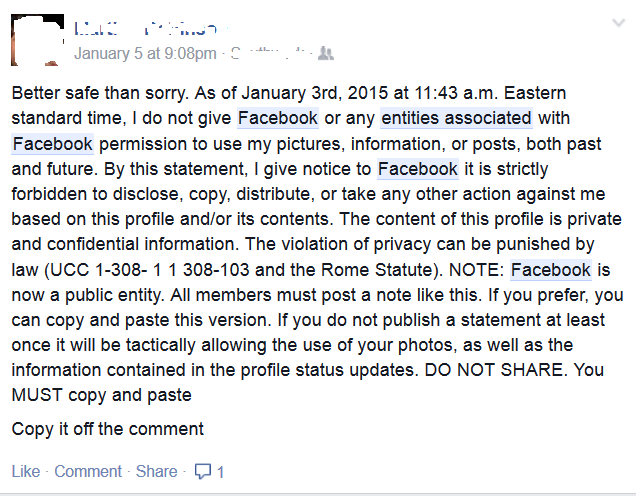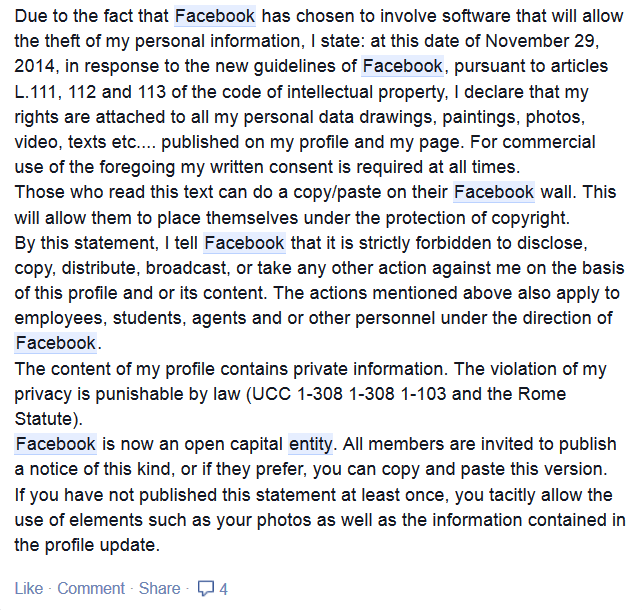Facebook users around the world have reported a new tide of one of the network’s longer-lasting hoaxes - a legal disclaimer which allows users to regain copyright over their images and other content.
There are several variations on the post - referencing the Berne convention (often spelt as the ‘Berner’ convention), or the Rome statutes.
Others refer to recent (false) news events which give Facebook more rights over user content, referencing news sites such as the BBC.
They all have one thing in common - they have no effect whatsoever on Facebook’s rights over images and other content posted to the network.
The hoax’s effect is simply to give users a false sense of security about their rights over their own content.

The new variations of the hoax have one thing in common - they have no effect on your legal rights (Picture: Facebook)
Facebook privacy - why the statement doesn't work
As with most online services, users agree by using Facebook to abide by the terms of several documents including its privacy policy and terms and policies.
Nothing any user can post on the network will diminish the legal force of these documents.
Regardless of whether users post the paragraphs or not, the safest thing to do with any truly private content is not to post it to Facebook at all (see below).
Like all social networks, Facebook users have little control over how content is used once it’s posted - not by Facebook, but by other users including their friends.
A long-running hoax
The hoax consists of several variations on the same theme - paragraphs of convincing-sounding legalese which mean Facebook no longer has copyright over users’ pictures, text and links.
Except, of course, the paragraphs have no effect whatsoever.
Users are encouraged to copy, paste and share the hoax document – hence various versions of it spread like a virus every so often.
Many Facebook users might have seen a version in 2015 beginning, ‘Due to the fact that Facebook has chosen to involve software that will allow the theft of my personal information, I state: at this date of January 4, 2015, in response to the new guidelines of Facebook, pursuant to articles L.111, 112 and 113 of the code of intellectual property, I declare...’
Nothing you can post on your wall will make any difference to Facebook’s rights over your images, text or other content posted to the site.
Snopes says that the hoax is actually even older than it appears - being a variation on a document from the early 2000s which users believed would prevent law enforcement from accessing piracy websites.
Facebook's actual rights
In Facebook’s case, the hoax is based on the false premise that Facebook has changed its policies to give itself more rights over your content.
Facebook itself debunked this in a statement when one variation on the hoax began circulating, saying, ‘There is a rumor circulating that Facebook is making a change related to ownership of users' information or the content they post to the site. This is false. Anyone who uses Facebook owns and controls the content and information they post, as stated in our terms. They control how that content and information is shared. That is our policy, and it always has been.’

Variations on the scam cite different legal statutes
What you can do (in real life)
In legal terms, users still own the copyright to images and other content posted on Facebook. The network merely has a ‘licence’ to use, distribute and share that content
In practical terms, though, if you have shared something via Facebook, it can be difficult to control how that content is used.
Content that has already been shared via the network is difficult to control - even if users delete their Facebook account, if the content has been shared by other users, Facebook still has a right to distribute it.
Facebook says, ‘[This] License ends when you delete your IP content or your account unless your content has been shared with others, and they have not deleted it.’
Taking control over your content on the network can go a long way towards controlling how others use it - a detailed We Live Security guide is here.
But for privacy conscious users, the easiest way to control how content is used is not to share it on Facebook at all if you are worried about how it may be used.
If you have already done so, steps to limit the audience and control posts are detailed in this extended guide to Facebook privacy.




